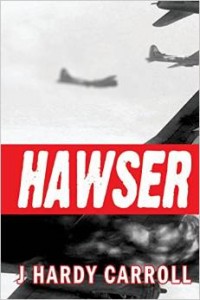BOOK | FICTION | LITERARY
HAWSER by J Hardy Carroll
RATING: ★ ★ ★ ★
To one who considers some of his favorite literary works to be those about World War II – SLAUGHTERHOUSE FIVE and CATCH 22 being the obvious ones – the war seems to be very present for me, when in fact it is now eighty years in our past. With it now so far removed from us, and with the space filled in by so many countless other wars, it really is quite an accomplishment that author J Hardy Carroll was able to bring the period back to us in such a vivid and entertaining way.
HAWSER, our selection for Volume 3 of the Indie Author Book Selection & Review (IABS&R), is a finely weaved, fascinating tale of Hawser (don’t bother asking him his real name) as he recounts his time as a B-17 bombardier during the Allies’s bombing campaign against the Germans.
We meet Hawser in a prisoner of war camp and it is from there he recounts for us all that has happened to him in the war before that point. We learn how he washed out as a pilot to become a bombardier, how he had to abandon his unit because of a murder, how he was abandoned as a child, how he met his arch nemesis, how he became trained in subversive warfare, how he became an expert bombardier, how he became burnt out and disillusioned by the war, and finally, how he tragically became a Nazi prisoner. From there we pick things back up from the present time in the story and we go along with him until the book’s conclusion.
Within that very rough sketch that I just laid out of the novel, there are so many – too many some may argue – different plot twists and sub plots filled with suspense and murder and love and passion and discovery and deceit along the way that several times throughout the course of my reading the book I had to stop to marvel at Carroll’s ability to manage it all so seamlessly and with such intrigue, all the while bringing out some of the larger and more poignant lessons learned from the war: mainly of the incalculable death and psychological and material devastation that the war wrought across the entire globe, as well as teaching us – or reminding us – that war isn’t always honorable and that not all people go to war to be heroes…some go to war simply because they want to kill.
And I was equally impressed with all the military and war jargon with which Carroll was able to flavor the story. It it his description of the B-17s and all their guns and ammunition and flight formations, and his knowledge of England during the war and its pastoral settings and its pubs and its quirky dialects that truly bring the story to life. Now I don’t know how much research Carroll had to do – my guess is a lot – and I don’t know how much of the detail he writes in the story is accurate – my guess is all of it – but I don’t really care. I don’t care because it all seems so real and so accurate that it significantly enhanced the story’s ability to pull me into that zen-like space of blissful verisimilitude.
In the end, the only flaws to be found with the book are in its ambition and achievement. At times the sub plots pull back the tempo of the story and I never really felt that there was that one thing, that one element of the story that had enough heft to bring an immediacy, an urgency of discovery, from the beginning to the end of the tale. But I see that more as a good problem for an Indie Author to have, as it is always better to have too much material to work with than not enough.
So I say congratulations and thank you to J Hardy Carroll for writing such a powerful story that both entertains and reminds us just how much effort and expense throughout history we silly humans have invested in our seemingly never ending quest to kill and conquer each other.
~~~~
RATING SYSTEM:
★ = UNREADABLE
★ ★ = POOR READ
★ ★ ★ = AVERAGE READ
★ ★ ★ ★ = OUTSTANDING READ
★ ★ ★ ★ ★ = EXCEPTIONAL READ









